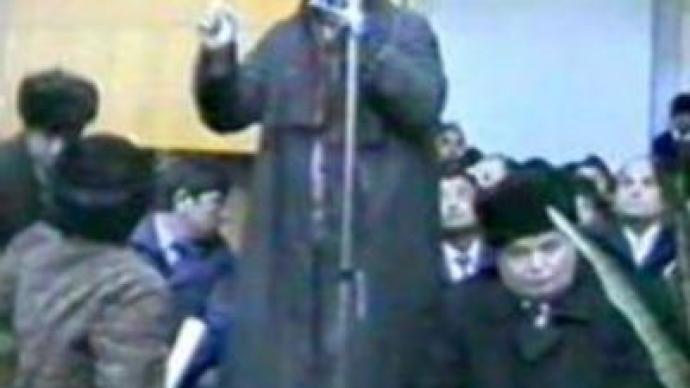Pakistani Army denies arrest of Uzbek militant leader

The Pakistani Army has denied earlier claims it arrested Uzbek militant leader Tahir Yuldashev. The announcement follows heavy fighting in the Waziristan province between Islamic militants and armed groups from local tribes.
Almost 20 militants have reportedly been killed during recent fighting in the mountainous South Waziristan province in Pakistan. Twelve of them were allegedly members of a terrorist organisation known as the Islamic Movement of Uzbekistan.It's one of the most active terrorist groups, known for its close ties with Al-Qaeda and the Taliban. The IMU mostly includes natives of Uzbekistan and the neighbouring Central Asian republics. It was formed in 1996 and has been fighting the Uzbek government for more than a decade.Its purpose was the creation of an Islamic state in the Ferghana Valley which would unite believers of Islam in the region.According to reports from intelligence services, there were some 10,000 fighters in the organisation.However, thanks to efforts by the government, their number has been reduced to only a few thousand.Its political and spiritual leader, Tahir Yuldashev, also known as Mohhamad Tahmir Faruk, has been on the federal wanted list since 1992.His closest ally, Dzhuma Hodzhaev, also known as Dzhuma Namangani, a former paratrooper, was responsible for carrying out the group's military operations. He was supposedly killed during a military operation in 2001 but his death remains unconfirmed.Before the creation of the Islamic Movement of Uzbekistan, Yuldashev was a part of several other militant organisations – among them the “Justice Society”, which he led in 1991, “Warriors of Islam” and “Tovba”.His criminal groups robbed and killed wealthy Uzbeks, using the proceeds to finance further attacks.In 1992 the Uzbek government launched an anti-terrorist campaign and Yuldashev fled to Afghanistan, where he pledged his alliance to Taliban leader Mullah Omar, and managed to escape justice.Several years later he became the leader of the Islamic Movement in Uzbekistan and even planned a coup attempt against the country's government.A series of terrorist attacks on the Uzbek capital city of Tashkent in 1999 claimed dozens of lives and was followed by several further raids in the region.During the so-called Batkent raid IMU's militants simultaneously entered two former Soviet republics – Kyrgyzstan and Uzbekistan – where they fought the regular armies of both states. Despite announcements by the Uzbek government that the activity of Islamic militants in the region has been suppressed, the movement is as outspoken as ever.The militants are extremely mobile, meaning the authorities have a nearly impossible task tracing them and preventing their attacks.Due to this, Russian, U.S. and UK security services have put the organisation on the black list as one of the most dangerous terrorist groups in the world.
You can share this story on social media:












